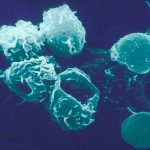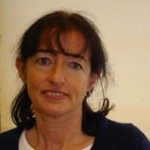Link to Pubmed [PMID] – 24317038
Nat. Immunol. 2014 Jan;15(1):27-35
The generation of T cells depends on the migration of hematopoietic progenitor cells to the thymus throughout life. The identity of the thymus-settling progenitor cells has been a matter of considerable debate. Here we found that thymopoiesis was initiated by a first wave of T cell lineage-restricted progenitor cells with limited capacity for population expansion but accelerated differentiation into mature T cells. They gave rise to αβ and γδ T cells that constituted Vγ3(+) dendritic epithelial T cells. Thymopoiesis was subsequently maintained by less-differentiated progenitor cells that retained the potential to develop into B cells and myeloid cells. In that second wave, which started before birth, progenitor cells had high proliferative capacity but delayed differentiation capacity and no longer gave rise to embryonic γδ T cells. Our work reconciles conflicting hypotheses on the nature of thymus-settling progenitor cells.




